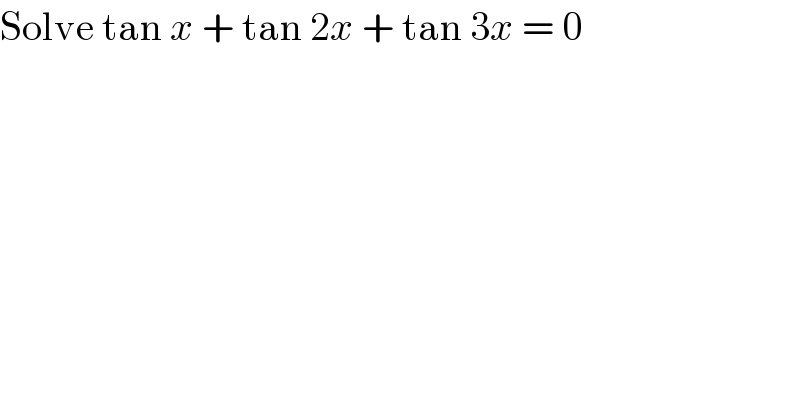
Question Number 14758 by Tinkutara last updated on 04/Jun/17

$$\mathrm{Solve}\:\mathrm{tan}\:{x}\:+\:\mathrm{tan}\:\mathrm{2}{x}\:+\:\mathrm{tan}\:\mathrm{3}{x}\:=\:\mathrm{0} \\ $$
Commented by Tinkutara last updated on 04/Jun/17

$$\mathrm{Answer}:\:{x}\:=\:\frac{{n}\pi}{\mathrm{3}}\:,\:{n}\pi\:\pm\:\mathrm{tan}^{−\mathrm{1}} \:\frac{\mathrm{1}}{\sqrt{\mathrm{2}}} \\ $$$$\mathrm{where}\:{n}\:=\:\mathrm{0},\:\pm\:\mathrm{1},\:\pm\:\mathrm{2} \\ $$$$\mathrm{This}\:\mathrm{is}\:\mathrm{given}\:\mathrm{exactly}\:\mathrm{in}\:\mathrm{my}\:\mathrm{book}. \\ $$
Commented by ajfour last updated on 04/Jun/17

$${what}\:{about}\:{x}={n}\pi. \\ $$
Commented by Tinkutara last updated on 04/Jun/17

$$\mathrm{No}.\:{x}\:=\:{n}\pi\:\mathrm{is}\:\mathrm{not}\:\mathrm{given}.\:\mathrm{What}\:\mathrm{is}\:\mathrm{given} \\ $$$$\mathrm{I}\:\mathrm{have}\:\mathrm{written}\:\mathrm{exactly}. \\ $$
Commented by mrW1 last updated on 04/Jun/17

$${x}={n}\pi\:{is}\:{definitively}\:{a}\:{solution}.\:{This} \\ $$$${can}\:{be}\:{easily}\:{checked}. \\ $$
Answered by mrW1 last updated on 04/Jun/17

$$\mathrm{tan}\:{x}+\mathrm{tan}\:\mathrm{2}{x}=−\mathrm{tan}\:\mathrm{3}{x}=−\mathrm{tan}\:\left({x}+\mathrm{2}{x}\right) \\ $$$$\mathrm{tan}\:{x}+\mathrm{tan}\:\mathrm{2}{x}=−\frac{\mathrm{tan}\:{x}+\mathrm{tan}\:\mathrm{2}{x}}{\mathrm{1}−\mathrm{tan}\:{x}\:\mathrm{tan}\:\mathrm{2}{x}} \\ $$$$\Rightarrow\mathrm{tan}\:{x}+\mathrm{tan}\:\mathrm{2}{x}=\mathrm{0}\:\:...\left(\mathrm{1}\right) \\ $$$${or} \\ $$$$\mathrm{1}−\mathrm{tan}\:{x}\:\mathrm{tan}\:\mathrm{2}{x}=−\mathrm{1} \\ $$$$\Rightarrow\mathrm{tan}\:{x}\:\mathrm{tan}\:\mathrm{2}{x}=\mathrm{2}\:\:\:\:...\left(\mathrm{2}\right) \\ $$$$ \\ $$$$\left(\mathrm{1}\right) \\ $$$$\mathrm{tan}\:{x}=−\mathrm{tan}\:\mathrm{2}{x}=−\frac{\mathrm{2tan}\:{x}}{\mathrm{1}−\mathrm{tan}^{\mathrm{2}} \:{x}} \\ $$$$\Rightarrow\mathrm{tan}\:{x}=\mathrm{0}\:\:\:\:\:\:...\left(\mathrm{1}.\mathrm{1}\right) \\ $$$${or} \\ $$$$\mathrm{1}−\mathrm{tan}^{\mathrm{2}} \:{x}=−\mathrm{2} \\ $$$$\Rightarrow\mathrm{tan}^{\mathrm{2}} \:{x}=\mathrm{3}\:\:\:\:\: \\ $$$$\Rightarrow\mathrm{tan}\:{x}=\pm\sqrt{\mathrm{3}}\:\:\:\:...\left(\mathrm{1}.\mathrm{2}\right) \\ $$$$ \\ $$$$\left(\mathrm{2}\right) \\ $$$$\mathrm{tan}\:{x}\:\frac{\mathrm{2tan}\:{x}}{\mathrm{1}−\mathrm{tan}^{\mathrm{2}} \:{x}}=\mathrm{2} \\ $$$$\frac{\mathrm{tan}^{\mathrm{2}} \:{x}}{\mathrm{1}−\mathrm{tan}^{\mathrm{2}} \:{x}}=\mathrm{1} \\ $$$$\mathrm{tan}^{\mathrm{2}} \:{x}=\frac{\mathrm{1}}{\mathrm{2}} \\ $$$$\Rightarrow\mathrm{tan}\:{x}=\pm\frac{\mathrm{1}}{\sqrt{\mathrm{2}}}\:\:\:\:...\left(\mathrm{2}\right) \\ $$$$ \\ $$$${All}\:{solutions}\:{with}\:{k}\in\mathbb{Z}: \\ $$$$\left(\mathrm{1}.\mathrm{1}\right)\Rightarrow\:{x}={k}\pi \\ $$$$\left(\mathrm{1}.\mathrm{2}\right)\Rightarrow\:{x}={k}\pi\pm\mathrm{tan}^{−\mathrm{1}} \sqrt{\mathrm{3}}={k}\pi\pm\frac{\pi}{\mathrm{3}} \\ $$$$\left(\mathrm{2}\right)\Rightarrow\:{x}={k}\pi\pm\mathrm{tan}^{−\mathrm{1}} \frac{\mathrm{1}}{\sqrt{\mathrm{2}}}=\:{or}\:={k}\pi+\frac{\pi}{\mathrm{2}}\pm\mathrm{tan}^{−\mathrm{1}} \sqrt{\mathrm{2}} \\ $$
Commented by Tinkutara last updated on 04/Jun/17

$$\mathrm{But}\:\mathrm{answer}\:\mathrm{given}\:\mathrm{in}\:\mathrm{my}\:\mathrm{book}\:\mathrm{is} \\ $$$$\mathrm{different}! \\ $$
Commented by mrW1 last updated on 04/Jun/17

$${I}\:{had}\:{a}\:{mistake}.\:{It}'{s}\:{corrected}\:{now}. \\ $$
Answered by ajfour last updated on 04/Jun/17
![let tan x=t t+((2t)/(1−t^2 ))+((t(3−t^2 ))/(1−3t^2 ))=0 ⇒ t^2 ≠1, 3 now, factorising to get, t[1+(2/(1−t^2 ))+((3−t^2 )/(1−3t^2 ))]=0 t[((3−t^2 )/(1−t^2 ))+((3−t^2 )/(1−3t^2 ))]=0 t(3−t^2 )[((2−4t^2 )/((1−t^2 )(1−3t^2 )))]=0 ⇒ t=tan x=0 , ±(√3) , ±(1/(√2)) x=n𝛑, n𝛑±(𝛑/3), n𝛑±tan^(−1) (1/(√2)) .](Q14768.png)
$${let}\:\mathrm{tan}\:{x}={t} \\ $$$$\:{t}+\frac{\mathrm{2}{t}}{\mathrm{1}−{t}^{\mathrm{2}} }+\frac{{t}\left(\mathrm{3}−{t}^{\mathrm{2}} \right)}{\mathrm{1}−\mathrm{3}{t}^{\mathrm{2}} }=\mathrm{0} \\ $$$$\Rightarrow\:\:\:{t}^{\mathrm{2}} \neq\mathrm{1},\:\mathrm{3} \\ $$$$\:{now},\:{factorising}\:{to}\:{get}, \\ $$$$\:\:\:\:\:\:{t}\left[\mathrm{1}+\frac{\mathrm{2}}{\mathrm{1}−{t}^{\mathrm{2}} }+\frac{\mathrm{3}−{t}^{\mathrm{2}} }{\mathrm{1}−\mathrm{3}{t}^{\mathrm{2}} }\right]=\mathrm{0} \\ $$$$\:\:\:\:\:\:\:\:\:\:{t}\left[\frac{\mathrm{3}−{t}^{\mathrm{2}} }{\mathrm{1}−{t}^{\mathrm{2}} }+\frac{\mathrm{3}−{t}^{\mathrm{2}} }{\mathrm{1}−\mathrm{3}{t}^{\mathrm{2}} }\right]=\mathrm{0} \\ $$$$\:\:\:{t}\left(\mathrm{3}−{t}^{\mathrm{2}} \right)\left[\frac{\mathrm{2}−\mathrm{4}{t}^{\mathrm{2}} }{\left(\mathrm{1}−{t}^{\mathrm{2}} \right)\left(\mathrm{1}−\mathrm{3}{t}^{\mathrm{2}} \right)}\right]=\mathrm{0} \\ $$$$\:\:\Rightarrow\:\:{t}=\mathrm{tan}\:{x}=\mathrm{0}\:,\:\pm\sqrt{\mathrm{3}}\:,\:\pm\frac{\mathrm{1}}{\sqrt{\mathrm{2}}}\:\: \\ $$$$\boldsymbol{{x}}=\boldsymbol{{n}\pi},\:\boldsymbol{{n}\pi}\pm\frac{\boldsymbol{\pi}}{\mathrm{3}},\:\boldsymbol{{n}\pi}\pm\mathrm{tan}^{−\mathrm{1}} \frac{\mathrm{1}}{\sqrt{\mathrm{2}}}\:. \\ $$
Commented by Tinkutara last updated on 04/Jun/17

$$\mathrm{Thanks}\:\mathrm{Sir}! \\ $$
